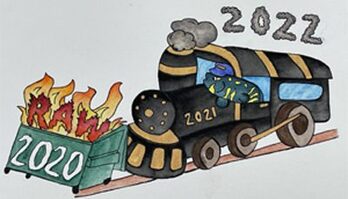Morning Buzz Abstracts
Watch Videos (Login required)
|
The Kraken Curriculum - A New Professional Development Tool
Barrett Christie, Jennie Janssen, Maritime Aquarium at Norwalk, National Aquarium Full Abstract
Professional development for aquarists, LSS operators, divers, and water quality technicians doesn’t just have to happen once a year at RAW; it can happen every day right at your home institution. Professional development (PD) can require substantial investments of time, but as staff become more knowledgeable and proficient, such investments in time pay large dividends. Surveys of continuing education among aquarium professionals (n=150) indicate that 28% complete no PD on an annual basis, and the majority (>50%) do less than 10h/y (mean 13h/y), though time spent pursuing PD on personal time was significantly higher (32h/y). The first-year costs of onboarding, training, and inefficiencies associated with bringing on a new employee are significant, and at Maritime Aquarium that has been calculated to reach nearly $14,000 per staff member. Given these costs of training and developing new staff, efforts spent on in-house professional development can actually save resources and time if they lead to better staff retention and proficiency. Adding to the variety of resources available to managers to build an in-house professional development program, the Kraken Curriculum has been created from existing content on AnimalProfessional.com with links to supplemental materials, all curated by topic to lead individuals or groups through industry knowledge on animal husbandry, life support systems, water quality, veterinary care, collection planning, and more. Organizing existing content in this way allows for learning to occur from a breadth of perspectives, while also allowing industry knowledge gaps to be elucidated and filled through future presentations. |
Different Brains Different Voices
David Sanchez, Moody Gardens Aquarium Full Abstract
With a staff with wide ranging experiences, the differing personalities and backgrounds communication can be a challenge. How can staff leaders effectively convey information to staff in the most effective manner? Moody Gardens has begun a pilot program using the on-line personality test “16 Personalities” to identify different personality types and to teach staff what make their coworkers “tick”. This allows the staff to understand their coworkers better and avoid conflict that comes with miscommunication. |
Sharing the Wealth: Senior Biologist Presentations at Moody Gardens
Jennifer Randolph, Moody Gardens Aquarium Full Abstract
At the Aquarium at Moody Gardens, the aquarium husbandry staff has a variety of backgrounds and experience. Senior biologist staff are given the opportunity to give short presentations on a husbandry topic of their choice during weekly fish staff meetings. This not only makes sure that industry and institutional-specific information is communicated clearly and standardized for all aquarium staff, but also allows senior staff a way to deepen their knowledge and pass on their experience. In this talk I will highlight some of the presentations senior staff have given and future plans for this initiative. |
|
ChondroCensus 2022: Building and Streamlining Collaborative Capacity
Jennie Janssen, National Aquarium Full Abstract
The AZA SAFE Sharks and Rays International Census of Chondrichthyans in Human Care (aka the ChondroCensus), which launched in 2019 at www.sharksandraysproject.com as a reboot of the American Elasmobranch Society’s International Elasmobranch Census, has grown to contain 274 unique species from 235 facilities across 54 countries world-wide as of November 2021. To make this collection of data a truly useful tool for engaging in meaningful, strategic, and collaborative chondrichthyan conservation, stakeholder Teams can complete a survey providing basic husbandry info and add their organizational accrediting body. These data can then be searched by region, organizational accrediting body, genus or species, sex, and the surveyed husbandry criteria. In addition to streamlining periodic reporting required by organizational accrediting bodies, these new features will also anonymously connect stakeholders with each other and with the research community to advance husbandry practices and facilitate collaborative chondrichthyan conservation efforts. Teams always remain anonymous and thus maintain control over their data, as search results are only shown as the number of Teams per ChondroCensus Region. Thus, each stakeholder facility’s Team Coordinator holds the critical role of whether their Team chooses to respond to any requests for connection or information, thereby identifying themselves as stakeholders of the species a search query pertains to. |
A Sea Turtle Wetsuit as A Theraputic for Buoyancy Issues
Aiyana Reissman, Living Coast Discovery Center Full Abstract
A short time after closing our doors due to COVID, our rescued Loggerhead Sea Turtle experienced sudden changes in her buoyancy negatively impacting her quality of life. With limited resources, funding and time, our team quickly exhausted traditional medical options to remedy the issue. We began to explore other methods to manually achieve neutral buoyancy and in a collaborative effort with O’Neill Wetsuits, a custom wetsuit was developed to allow for targeted weight adjustments. With all in person meetings restricted by the pandemic, measurements, prototypes and data were all exchanged back and forth virtually and through the post with a final product developed at the end of 2020. After several trials, the novel use of weighted wetsuit therapy was used to correct the problem, improving the sea turtles long term ability to swim, eat, and breathe. |

